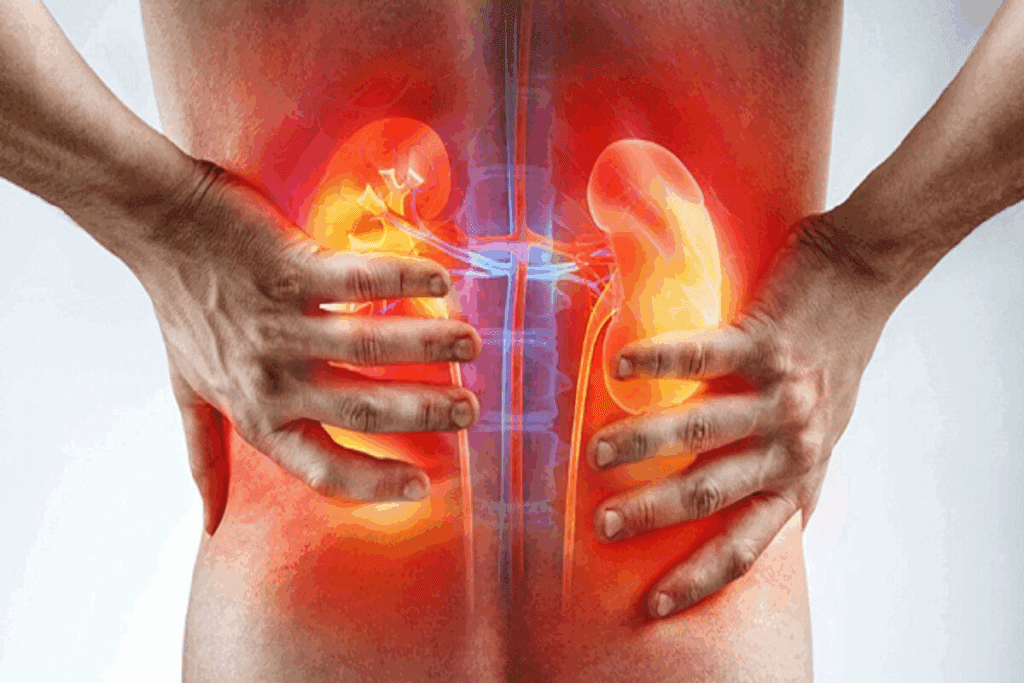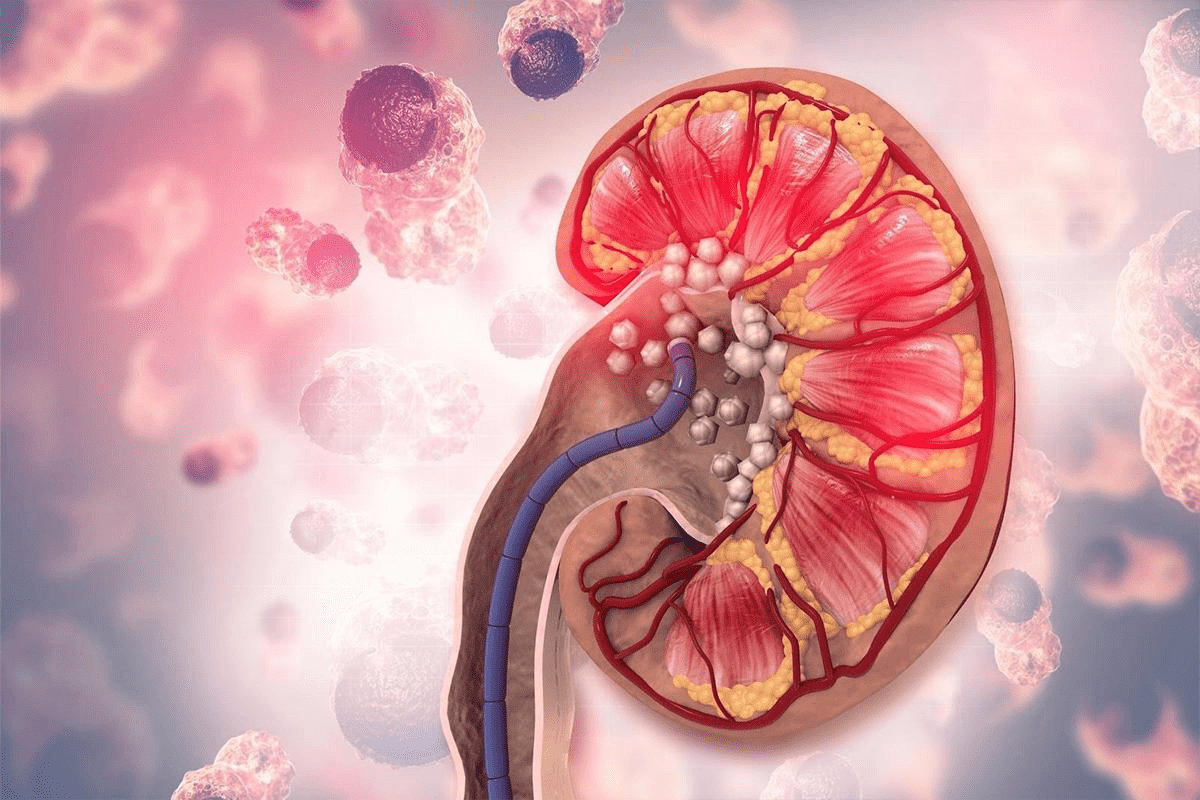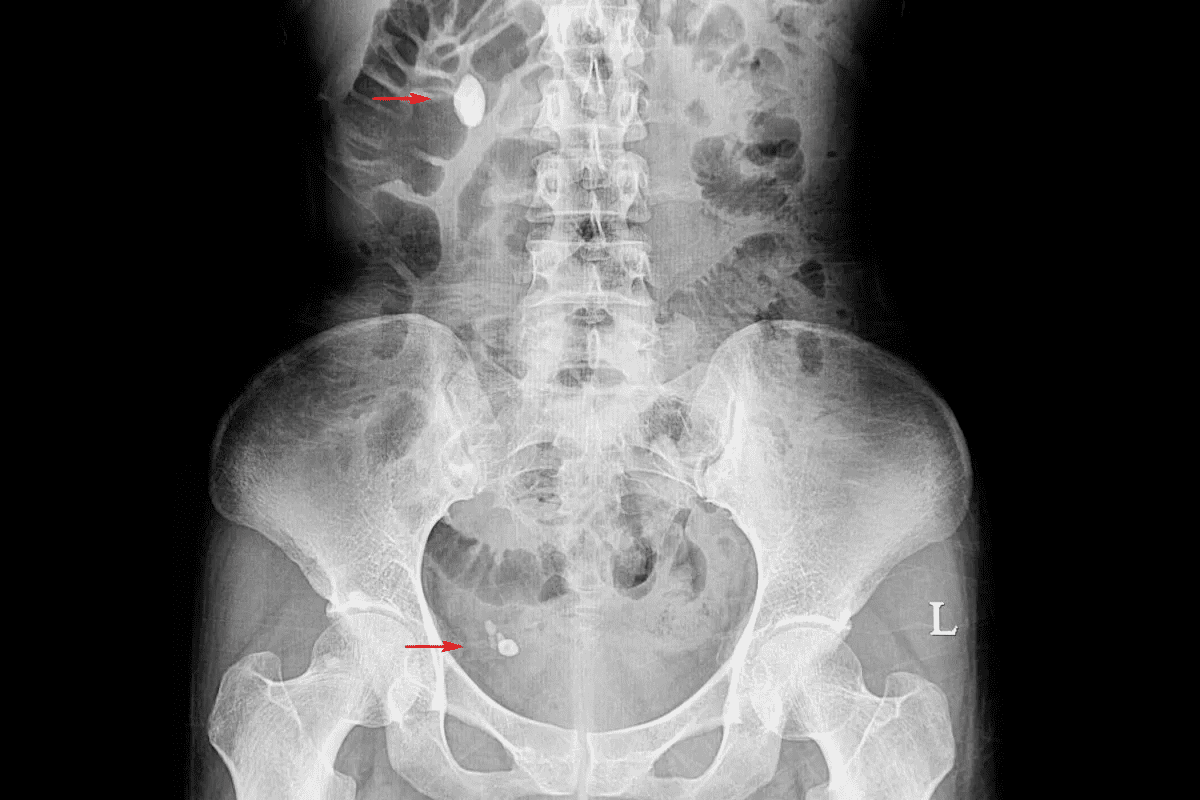
Do you often feel bloating and constipation when you have kidney stones? You’re not alone. Kidney stones affect over 600,000 Americans every year. They can also cause many other stomach problems.
At Liv Hospital, we offer top-notch medical care. We focus on both your kidney stone and your stomach health. We use the latest treatments and put our patients first.
Learn why kidney stones bloating and gastrointestinal issues like constipation can occur due to the body’s reaction to severe kidney pain.
Kidney stones are hard mineral deposits. They affect about 10 to 11 percent of people at some point. We’ll talk about how these stones can cause bloating and constipation.

Kidney stones are hard deposits that form inside the kidneys. They can be different sizes and types. Knowing about kidney stones is key to preventing and treating them.
Kidney stones are usually made of calcium oxalate, calcium phosphate, uric acid, or struvite. They form when there’s an imbalance in urine. This imbalance can be caused by dehydration, diet, or medical conditions.
The process of forming kidney stones is complex. It involves how concentrated the urine is, the presence of certain salts, and the urine’s pH level. For example, calcium oxalate stones often come from too much oxalate or hyperoxaluria.
About 10-11% of people will get kidney stones at some point. This number changes based on where you live, what you eat, and your genes. In the U.S., more people are getting kidney stones over time.
Changes in lifestyle and diet play a big role in kidney stone risk. Eating a lot of animal protein, sodium, and sugar can increase your risk.
Kidney stones can happen at any age, but they’re most common in adults between 30 and 50 years old. Men are more likely to get them than women, but women’s risk is rising.
Several things can increase your risk of getting kidney stones, including:
Understanding kidney stones means knowing what they are, how they form, and who’s at risk. By knowing this, you can prevent them and get the right medical care.

Knowing about the different types of kidney stones is key to treating them well. Kidney stones are solid masses that form in the kidneys. They happen when there’s an imbalance in the urine’s concentration of certain substances.
There are several types of kidney stones, each with its own characteristics and causes. The most common types include calcium stones, uric acid stones, struvite stones, and cystine stones.
Calcium stones are the most common type. They are often linked to what we eat. They are usually made of calcium oxalate, but some are calcium phosphate. Eating too much oxalate or not drinking enough water can lead to their formation.
Uric acid stones are common too. They are often linked to high-protein diets and some metabolic disorders. They are more common in men and can be linked to gout. To prevent these stones, managing uric acid levels through diet and medication is important.
Struvite stones are linked to urinary tract infections (UTIs). They can grow fast and become large, sometimes causing little symptoms until they block the flow. Struvite stones are more common in women, who are more likely to get UTIs.
Cystine stones are rare and happen in people with a genetic disorder called cystinuria. This disorder makes cystine leak into the urine, where it can crystallize and form stones. Managing cystinuria often involves medication and dietary changes to lower cystine levels.
Knowing the type of kidney stone is key to finding the right treatment and preventing more. Each type has its own characteristics and causes, needing a specific approach to manage and prevent.
Kidney stones and digestive problems are closely linked. They affect both the urinary and digestive systems. Symptoms like bloating, constipation, and discomfort are common.
Kidney stones can mess with your digestion. The urinary and digestive systems are close together. So, problems in one can impact the other.
Key factors that contribute to digestive issues in patients with kidney stones include:
Studies show that kidney stone patients often face digestive problems. They find that more people with kidney stones have these symptoms than others.
About 30% of kidney stone patients deal with digestive issues. This includes bloating and constipation. It shows why doctors need to treat both problems.
Common digestive symptoms experienced by patients with kidney stones include:
It’s key to understand how kidney stones and digestive issues are connected. By treating both, doctors can help patients better and lower the risk of more problems.
To understand how kidney stones cause constipation, we need to look at physical blockages, nerve interactions, and pain’s effects. These stones can affect not just the urinary system but also the digestive system.
Big kidney stones can block the urinary tract. This blockage puts pressure on nearby parts, including the digestive system. The urinary and digestive systems are close in the belly. This pressure can slow down bowel movements, leading to constipation.
The nerves for the urinary and digestive systems work together in complex ways. When a kidney stone irritates these nerves, it can mess with bowel movement control. This nerve pathway interaction can cause constipation by disrupting the digestive system’s normal function.
Studies show that kidney stone irritation can make certain neurotransmitters that slow down the gut. This slowing down can cause constipation.
Kidney stone pain is often very bad and can change how people act. People in pain might move less and eat differently, both of which can lead to constipation. For example, not moving much can slow down bowel movements, and eating less fiber can make stools harder.
The pain can also make people more stressed, which can make bowel habits worse. It’s important to manage pain well to help patients feel better and avoid constipation.
Understanding these causes helps us tackle constipation in kidney stone patients better. We need to treat the stones and also help with digestive symptoms.
Kidney stones can cause inflammation not just in the urinary tract but also in digestion. When kidney stones form, they irritate and inflame the urinary tract. This irritation can spread to the digestive organs nearby.
Kidney stones often trigger an inflammatory response in the urinary tract. This inflammation can cause pain and discomfort. It may also lead to infections. The urinary tract’s close location to the digestive system means inflammation can directly impact digestion.
Inflammation from kidney stones can also affect the intestines. This can cause bloating, gas, and changes in bowel habits. The close relationship between the urinary and digestive systems allows inflammation to spread, affecting digestive health.
Kidney stone-induced inflammation can also have systemic effects. The body’s inflammation response can lead to fatigue, nausea, and other symptoms. These symptoms can make digestive issues worse.
It’s important to understand how kidney stone-induced inflammation affects digestion. By treating both the kidney stones and digestive issues, healthcare providers can offer better care.
Patients with kidney stones often find relief with medication. But, some pain meds can harm their digestive health. It’s key to see how these side effects affect their digestion.
Pain meds, like opioids, help with kidney stone pain. Yet, they can slow down digestion, causing constipation and other issues. Opioids slow bowel movements and make stools harder and drier by binding to gut receptors. Other pain meds can also affect digestion, but not as much.
Opioid-induced constipation (OIC) is common in those taking opioid pain meds. It makes bowel movements hard, infrequent, or incomplete. OIC happens because opioids mess with gut contractions and fluid secretion. This constipation can be severe and may need extra treatment.
It’s vital to manage pain med side effects for patients with kidney stones. Ways to do this include adjusting doses, trying different pain meds, and using bowel regimens. Doctors might suggest laxatives, stool softeners, or other meds for OIC. Eating more fiber and drinking plenty of water can also help.
By knowing the side effects of pain meds and managing them, patients can get pain relief. This way, they can avoid digestive problems.
Dehydration is a big problem for both kidney stones and constipation. It’s very important to drink enough water. If we don’t, our body can’t work right, causing many issues.
When you have a kidney stone, you might feel very sick. You might not want to drink because of the pain and nausea. This makes dehydration worse, which can make your kidney stone and constipation problems even harder.
Dehydration makes it hard for your body to make soft stool. When your body takes water from your colon, your stool gets hard and dry. This leads to constipation. Also, dehydration slows down how food moves through your body, making constipation worse.
To stop dehydration from making kidney stones and constipation worse, we need to drink more water. Drinking lots of water helps prevent dehydration. It also lowers the chance of minerals in your urine forming stones.
Fluid Intake Recommendation | Benefit |
Drink at least 8-10 glasses of water per day | Helps prevent dehydration and reduces the risk of kidney stone formation |
Increase fluid intake during hot weather or when exercising | Compensates for lost fluids and maintains proper hydration levels |
Avoid sugary drinks and caffeine | Reduces the risk of dehydration and minimizes irritants to the digestive system |
Knowing how dehydration affects kidney stones and constipation helps us take action. Drinking enough water and making other healthy choices can greatly improve our health. It can also lower the chance of serious problems.
Distinguishing Kidney Stone Symptoms from Other Digestive Conditions
Kidney stone symptoms can be tricky to tell apart from other digestive issues. It’s important to know the key differences. We’ll look at how kidney stone symptoms compare to other stomach problems.
Many digestive problems can mimic kidney stone symptoms, like bloating and constipation. These include Irritable Bowel Syndrome (IBS), inflammatory bowel disease (IBD), and stomach infections.
IBS can cause stomach pain and changes in bowel movements, similar to kidney stones. But, IBS pain is usually not as severe as kidney stone pain.
To tell kidney stone symptoms from other digestive issues, we look at a few important things. These are the pain’s location and how bad it is, other symptoms, and the patient’s health history.
Location and Severity of Pain: Kidney stones cause sharp pain that starts in the back or side and moves to the lower abdomen or groin. In contrast, IBS might cause pain all over the stomach.
Accompanying Symptoms: Kidney stones often come with urinary symptoms like blood in the urine, needing to pee a lot, or painful pee. Digestive issues might bring on diarrhea, constipation, or bloating instead.
Symptom | Kidney Stones | Digestive Conditions |
Pain Location | Back, side, lower abdomen, groin | Diffuse abdominal area |
Pain Severity | Severe, sharp | Varies, often crampy |
Urinary Symptoms | Frequent, painful urination, hematuria | Rare |
Gastrointestinal Symptoms | Nausea, vomiting | Bloating, constipation, diarrhea |
When a patient has symptoms that could be either kidney stones or a digestive issue, we look at the whole picture. Severe pain and urinary symptoms point more towards kidney stones. But, if symptoms are more about the stomach, like bloating or bowel changes, it’s likely a digestive problem.
Getting a correct diagnosis needs a thorough check-up. This includes looking at the patient’s medical history, doing a physical exam, imaging tests, and lab work. By focusing on the key differences, we can make a better diagnosis and plan the right treatment.
To diagnose kidney stones, doctors use a mix of imaging tests and lab tests. This method helps them find kidney stones and understand how they affect digestion.
Imaging tests are key in finding kidney stones. The main tests are:
These tests help doctors know the size, location, and number of stones. This info is key for planning treatment.
Laboratory tests are important for checking what the stones are made of and the risk of more stones. Common tests include:
Doctors also look at digestive symptoms when dealing with kidney stones. They ask about symptoms like bloating, constipation, and stomach pain. They check how long these symptoms last and how bad they are.
By looking at both the stones and digestive symptoms, doctors can make a better treatment plan. This plan helps improve the patient’s overall health.
Effective treatment for kidney stones often involves addressing associated digestive symptoms. We know that kidney stones and digestive issues can be linked. A complete treatment plan can help with both conditions.
Medical treatments for kidney stones aim to manage pain, remove stones, and prevent future stones. Medications like pain relievers and alpha-blockers help with symptoms and stone passage.
In some cases, surgeries like Extracorporeal Shock Wave Lithotripsy (ESWL) or Ureteroscopy are needed to remove or break up big stones.
Procedure | Description | Benefits |
ESWL | Non-invasive shock wave therapy to break up stones | Minimally invasive, quick recovery |
Ureteroscopy | Direct visualization and removal of stones using a ureteroscope | High success rate, effective for larger stones |
Managing digestive symptoms like bloating and constipation requires lifestyle changes and medical treatments. Increasing fluid intake and adjusting diet can help with constipation.
To reduce bloating, avoid foods that cause gas and eat smaller meals. Sometimes, probiotics or digestive enzymes are suggested to improve gut health.
Dietary changes are key in managing both kidney stones and digestive symptoms. A balanced diet low in sodium and rich in fruits and vegetables helps prevent stones and supports digestive health.
For those with calcium stones, cutting down on oxalate-rich foods is advised. Also, staying hydrated is vital for preventing kidney stones and ensuring regular bowel movements.
We’ve looked into how kidney stones and digestive health are connected. We found that bloating and constipation are not just random symptoms. Kidney stones can really mess with your digestion, causing a lot of discomfort.
This connection is complex, involving physical blockages and inflammation. These issues can change how your body digests food. To tackle kidney stones and their digestive side effects, we need to look at both your urinary and digestive systems.
Healthcare experts can now better understand and treat kidney stone-related bloating and constipation. A complete care plan is key. It should include medical treatments, changes in diet, and lifestyle adjustments to help patients feel better.
In short, the connection between kidney stones, bloating, and constipation shows we need a more unified approach to care. This approach should consider how all parts of our body work together.
Yes, kidney stones can cause bloating and constipation. This is due to physical obstruction, nerve interactions, and inflammation.
Common symptoms include severe pain, nausea, and vomiting. Some people also experience digestive issues like bloating and constipation.
Kidney stones can affect digestive function. They cause physical pressure, interact with nerve pathways, and trigger inflammation.
Yes, dehydration can cause both kidney stones and constipation. It reduces fluid intake and affects bowel function.
Certain medications, like opioids, can cause constipation and other digestive issues in patients with kidney stones.
The main types of kidney stones are calcium, uric acid, struvite, and cystine stones. Each type has different characteristics and causes.
Kidney stones are diagnosed with imaging tests like CT scans, ultrasounds, and X-rays. Laboratory tests also analyze urine and blood samples.
Treatment includes medical interventions for pain management and dietary modifications. These help prevent future stones and alleviate digestive symptoms.
Yes, dietary changes can help manage both kidney stones and digestive symptoms. Increasing fluid intake and adjusting calcium and oxalate levels are key.
To distinguish symptoms, understand the location and severity of pain. Look for other symptoms like hematuria.
Yes, risk factors include dehydration, family history, certain dietary habits, obesity, and medical conditions affecting the urinary tract.
Yes, kidney stones can cause gas and bloating. This is due to inflammation and pressure on surrounding digestive organs.
To manage constipation, increase fluid intake and make dietary adjustments. Medications may also be needed, alongside treating the kidney stone.
Sivarajan, G., & Masterson, T. A. (2014). Ten-year Outcomes of Sexual Function After Radical Prostatectomy. European Urology, 66(2), 222-230. https://www.sciencedirect.com/science/article/abs/pii/S0302283813008476
Subscribe to our e-newsletter to stay informed about the latest innovations in the world of health and exclusive offers!
WhatsApp us